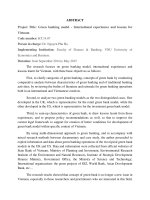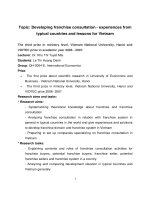Green banking model International experiences and lessons for Vietnam
Bạn đang xem bản rút gọn của tài liệu. Xem và tải ngay bản đầy đủ của tài liệu tại đây (12.24 KB, 3 trang )
ABSTRACT
Project Title: Green banking model - International experiences and lessons for
Vietnam
Code number: KT.14.07
Person in charge: Dr. Nguyen Phu Ha
Implementing Institution: Faculty of Finance & Banking, VNU University of
Economics and Business.
Duration: from September 2014 to May 2015
The research focuses on green banking model, international experiences and
lessons learnt for Vietnam, with three basic objectives as follows:
First, to clarify categories of green banking, concepts of green bank by conducting
comparative analysis between characteristics of green banking and of traditional banking
activities; by reviewing the bodies of literature and rationale for green banking operations
both in an international and Vietnamese contexts.
Second, to analyze two green banking models as the two distinguished cases. One
developed in the UK, which is representative for the retail green bank model, while the
other developed in the US, which is representative for the investment green bank model.
Third, to sum-up characteristics of green bank, to draw lessons learnt from those
experiences, and to propose policy recommendations as well, so that to improve the
current legal framework to support for creation of better conditions for development of
green bank model within specific context of Vietnam.
By using multi-dimensional approach to green banking, and in accompany with
mixed research methods between documentary and case study, the author proceeded to
exploit information and data about green banking operations of the two tipical green bank
models in the UK and US. Data and information were collected from official websites of
State Bank of Vietnam, Ministry of Planning and Investment, Environmental Research
Institute of the Environment and Natural Resources, Institute of Strategic Development
Finance Ministry, Government Office, the Ministry of Science and Technology;
International organizations: the green projects of GIZ, World Bank, Asian Development
Bank, etc ...
The research results showed that concept of green bank is no longer a new issue in
Vietnam, especially to those researchers and practitioners who are interested in this field,
However, a typical model of green bank has not been set up in Vietnam. A green bank
model should be a model that not only ensures good service quality as compared to
traditional banks but also have to ensure the harmonization among the four addressed
fundamental objectives, which are environment, customers, shareholders and community.
In this regard, 5 lessons learnt is sum up as as follows:
First, Vietnam must develop a green bank model which is based on the
experiences of the UK and the US, in which the state budget is part of capital resources
(as the experience of UK GIB suggested) and successful entrepreneurs, social investors
have strong roles in development of green banking and contributing to building green
bank model (as experienced by the case of FGB in the US).
In the specific context of Vietnam, with limitted sources of the State budget,
approach to international funding for setting up green bank or green banking projects
should be seriously considered as an effective way.
Second, Vietnam can set up two separated models of green bank, one is retail
banking models and the other should be investment banking model.
Third, the first green bank in Vietnam in the future should be set up either under
the basis of a bank holding company or a government agency with comprehensive legal
framework for a bank, which is licensed by the State Bank of Vietnam, or newly
establised as a legal entity, so that it can operates fully focusing on green bank
operations.
Fourth, international experiences also indicate that the green bank should be
associated with the phrase "Green Bank" in the official name when it is registered with
the State Bank of Vietnam, so that it can reinforce and raise awareness of the society
about the existence of a legal entity as the green bank model.
Fifth, in terms of sustainable development for green bank model, all aspects
relating to corporate governance, management of economic performance, risks and social
and environmenttal impacts should be reinforced in the strategic management and
business management of the bank.
Within the scope of the project, the author offers following five recommendations
to state authorities, which include:
Firstly, besides the issuant of Directive 03/CT-NHNN dated 03/24/2015, the State
Bank of Vietnam needs to continue to improve the legal framework to support green bank
activities.
Second, commercial banks operating in Vietnamese market should make revise
current credit and lending policies, in which make priorities for business sectors and
industries friendly with the enviornment.
Third, in terms of risk management, commercial banks need to integrate the
management of environmental risks, social and risk management systems in the current
business risk management. To do this, they need to build or strengthen the human
resources department responsible for environmental risk management, development of
social and green credit for gradually implementing risk management systems
environment in future cases.
Fourth, experiences in the UK and the US showed that Vietnam's commercial
banks should consider the Equator Principles and the most advanced practices of risk
management and social environment, and on that basis to build Action Program for
organizational self-assessment criteria defined in Equator Principles.
Fifth, theoritical and practical studies of green banking, green bank model should
be made and should be incorporated into the short training programs organised by State
bank of Vietnam and universities, so that to educate people and to improve awareness of
the bankers, managers, staff and officers about the role and the need to develop models of
green banks in the future.









